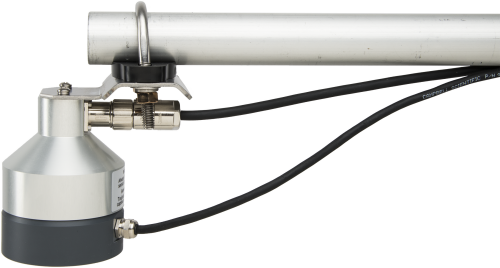
Prevents ice from coating the transducer






Overview
Note: This product has limited availability. Please consider the SnowVue™10 Digital Snow-Depth Sensor for snow-depth measurements and the TempVue™20 Pt100 Digital Air Temperature Sensor or HygroVue™10 Digital Temperature and Relative Humidity Sensor with M12 Connector for air temperature measurements.
The SR50AH Heated Sonic Distance Sensor provides a non-contact method for determining snow depth. It determines depth by emitting an ultrasonic pulse and then measuring the elapsed time between the emission and return of the pulse. An air temperature measurement is required to correct for variations of the speed of sound in air. The SR50AH includes an integrated heater that prevents ice and rime from coating the transducer.
Read MoreBenefits and Features
- Non-contact method for determining snow depth
- Integrated transducer heater; rugged enough for rime and ice environments
- Wide operating temperature range
- User-selectable options for output
- Uses a multiple echo processing algorithm to help ensure measurement reliability
- Compatible with most Campbell Scientific data loggers
Technical Description
The SR50AH was designed to meet the stringent requirements of measuring depths and uses a multiple echo processing algorithm to help ensure measurement reliability. The addition of a heating element around the transducer prevents ice and rime from coating the transducer with minimal power requirements.
SDI-12, RS-232, and RS-485 output options are available for measuring the SR50AH. Campbell Scientific’s MD485 interface can be used to connect one or more SR50AH sensors in RS-485 mode to an RS-232 device. This can be useful for sensors that require lead lengths that exceed the limits of either RS-232 or SDI-12 communications.
Images



Compatibility
Please note: The following shows notable compatibility information. It is not a comprehensive list of all compatible products.
Dataloggers
| Product | Compatible | Note |
|---|---|---|
| CR1000 (retired) | SDI-12 and RS-232. For RS-485, requires an MD485 interface or similar RS-485 to RS-232 interface. | |
| CR1000X (retired) | SDI-12 and RS-232. For RS-485, requires an MD485 interface or similar RS-485 to RS-232 interface. | |
| CR300 (retired) | SDI-12 and RS-232. For RS-485, requires an MD485 interface or similar RS-485 to RS-232 interface. | |
| CR3000 | SDI-12 and RS-232. For RS-485, requires an MD485 interface or similar RS-485 to RS-232 interface. | |
| CR310 | SDI-12 and RS-232. For RS-485, requires an MD485 interface or similar RS-485 to RS-232 interface. | |
| CR350 | SDI-12 and RS-232. For RS-485, requires an MD485 interface or similar RS-485 to RS-232 interface. | |
| CR6 | SDI-12, RS-232, and RS-485 | |
| CR800 (retired) | SDI-12 and RS-232. For RS-485, requires an MD485 interface or similar RS-485 to RS-232 interface. | |
| CR850 (retired) | SDI-12 and RS-232. For RS-485, requires an MD485 interface or similar RS-485 to RS-232 interface. |
Miscellaneous
| Product | Compatible | Note |
|---|---|---|
| GRANITE 6 (retired) | SDI-12 and RS-232. For RS-485, requires an MD485 interface or similar RS-485 to RS-232 interface. |
Additional Compatibility Information
Data Logger Considerations
One single-ended channel per probe is required; an excitation channel can be shared by several probes.
Specifications
| Measurement Time | < 1.0 s |
| Output Options | SDI-12 version 1.3, RS-232, RS-485 (output options selected by configuring internal jumpers) |
| Baud Rates | 1200 to 38400 bps (RS-232, RS-485 modes) |
| Power Requirements | 9 to 18 Vdc (typically powered by data logger’s 12 Vdc power supply) |
| Measurement Range | 0.5 to 10 m (1.6 to 32.8 ft) |
| Beam Acceptance | ~30° |
| Resolution | 0.25 mm (0.01 in.) |
| Accuracy | ±1 cm (0.4 in.) or 0.4% of distance to target (whichever is greatest). Requires external temperature compensation. |
| Temperature Accuracy |
|
| Operating Temperature Range | -45° to +50°C |
| Compliance | CE compliant |
| Length | 10.1 cm (4.0 in.) |
| Diameter | 7.5 cm (3 in.) |
| Cable Weight | 250 g (8.2 oz) for a 4.57 m (15 ft) cable |
Maximum Cable Length |
|
| -NOTE- | Cable lengths greater than 60 m require a heavier gage wire if the power supply drops below 11 Vdc. |
| SDI-12 | 60 m (200 ft) |
| RS-232 |
60 m (200 ft) Baud rates ≤ 9600 bps |
| RS-485 | 300 m (984 ft) |
Heater |
|
| Heater Resistance | 75 ohm |
| Nominal Operating Voltage |
12 V (ac or dc) Use a properly conditioned low-noise power source. A noisy power source will affect operation of the sensor. |
| Maximum Rated Wattage | 3 W |
| Maximum Rated Voltage | 15 V (ac or dc) |
| Maximum Operating Temperature |
25°C Turn the heater power off at temperatures above 25°C. This prevents damage to the sensor and reduces power consumption. |
Resources and Links
Downloads
SR50AH heater control programs v.1 (4 kB) 22-01-2020
CR6 and CR1000X programs that read the SR50AH SDI-12 output and control the SR50AH heater. A 107 sensor provides the temperature measurement needed for temperature compensation. The programs use the data filtering method described in the manual.
Privacy Policy Update
We've updated our privacy policy. Learn More
Cookie Consent
Update your cookie preferences. Update Cookie Preferences



